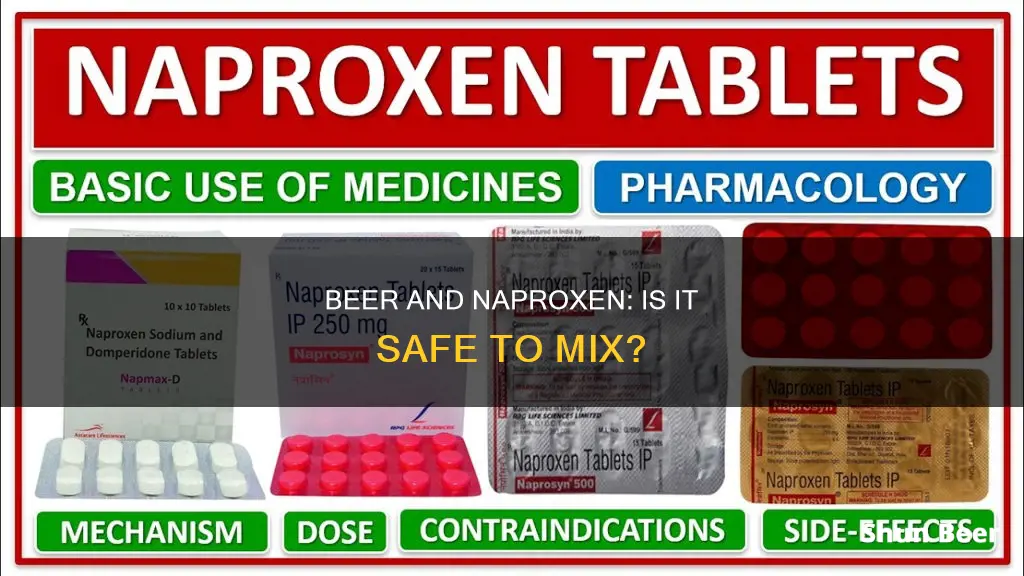
Drinking alcohol while taking naproxen can have serious health consequences. Naproxen is a nonsteroidal anti-inflammatory drug (NSAID) commonly used to treat pain and inflammation in muscles and joints. While it is generally safe to consume alcohol in moderation while taking naproxen, mixing the two can lead to adverse side effects, especially if alcohol consumption exceeds the recommended daily intake. Both substances can irritate the stomach and increase the risk of gastritis and stomach bleeding. In severe cases, mixing naproxen and alcohol can result in dangerous health issues such as holes in the stomach or intestine, heartburn, and blood in stools or vomit. It is crucial to follow the recommended dosage for naproxen and not exceed the daily alcohol limit to minimise the risk of harmful side effects.
| Characteristics | Values |
|---|---|
| Naproxen | A nonsteroidal anti-inflammatory drug (NSAID) used to treat pain and inflammation in muscles and joints |
| Alcohol | A drug that can irritate the stomach and increase the risk of stomach bleeding |
| Mixing Naproxen and Alcohol | Can cause dangerous side effects such as stomach ulcers, bleeding of the stomach, acid reflux, and stomach irritation |
| Minimizing Risks | Take naproxen as prescribed, stick to recommended daily alcohol intake, avoid using other NSAIDs, and take a Proton Pump Inhibitor to protect the stomach lining |
| Waiting Period | Wait 12-17 hours after taking Naproxen before drinking alcohol |
What You'll Learn

Naproxen and alcohol can cause gastrointestinal issues
Naproxen is a nonsteroidal anti-inflammatory drug (NSAID) commonly used to treat pain and inflammation in muscles and joints. It is typically prescribed to treat rheumatoid arthritis, osteoarthritis, and gout, but it can also be used to treat period pain, back pain, and everyday aches and pains. While naproxen is generally safe when taken as directed, mixing it with alcohol can have dangerous side effects.
Both naproxen and alcohol can cause gastrointestinal issues, and consuming them together can increase the risk of developing stomach-related problems. Naproxen works by reducing the production of prostaglandin, a substance that contributes to inflammation and pain. However, prostaglandin also has protective effects on the stomach lining. By reducing prostaglandin, naproxen can damage the stomach lining, leading to ulcers, bleeding, and other serious digestive issues.
Alcohol is also known to irritate the stomach and increase the likelihood of developing gastritis and stomach bleeding. When combined with naproxen, the risk of developing these stomach-related problems is significantly increased. This is especially true if the alcohol consumption exceeds the recommended daily intake and if naproxen is not taken as prescribed.
To minimise the risks of gastrointestinal issues when taking naproxen, it is important to follow your doctor's instructions and stick to the recommended daily alcohol intake. It is also advisable to wait 12 to 17 hours after taking naproxen before consuming alcohol, as this is the medication's half-life, or the time it takes for the body to eliminate half of the active substance. Additionally, taking a proton pump inhibitor (PPI) such as Omeprazole can help protect the stomach lining.
Drinking Beer on Thai Beaches: What's Allowed?
You may want to see also

Mixing the two can lead to holes in the stomach or intestine
Mixing naproxen and alcohol can have severe consequences for your health. Naproxen is a nonsteroidal anti-inflammatory drug (NSAID) commonly used to treat pain and inflammation in muscles and joints. It is typically prescribed to treat rheumatoid arthritis, osteoarthritis, gout, period pain, back pain, and everyday aches and pains. While it is generally safe to take naproxen without harmful side effects, misusing naproxen or mixing it with alcohol can cause serious damage to your health.
Naproxen works by reducing the amount of prostaglandin in the body. Prostaglandin is responsible for inflammatory reactions, so by limiting its production, naproxen can effectively reduce pain and swelling. However, prostaglandin also has protective effects on the stomach lining, and naproxen reduces these. Normally, this does not cause side effects, especially if you use it as directed. However, taking large amounts of naproxen or mixing it with alcohol can cause damage to the stomach lining, leading to serious issues.
The combination of naproxen and alcohol can result in severe side effects, including holes in the stomach or intestine. This is because both substances can irritate the stomach and increase the likelihood of developing gastritis and stomach bleeding. Alcohol can also increase the possibility of stomach bleeding by thinning the blood and impairing platelet function. This combination can be extremely dangerous, and you should be aware of the risks before mixing the two.
If you mix naproxen and alcohol, you may experience the following additional side effects:
- Vomiting blood or vomit that looks like coffee grounds
- Bloody or black stools
- Increased risk of ulcers
- Heartburn and digestion issues
- Gastritis (inflammation of the stomach lining)
To minimise the risks of these side effects, it is important to take naproxen exactly as prescribed by your doctor and to stick to the recommended daily alcohol intake. It is also recommended to wait 12 to 17 hours after taking naproxen before consuming alcohol, as this is the time it takes for the medication to be eliminated from your body. Remember, drinking alcohol while taking any medication can have adverse effects, and it is crucial to always inform your doctor about all medications you are taking to avoid potentially harmful interactions.
Exploring Beer Drinking Rules on Massachusetts Beaches
You may want to see also

The combination may cause vomiting and digestion issues
Naproxen is a pain reliever commonly used to treat muscle and joint aches and inflammation. It is generally safe to consume naproxen without harmful side effects, but misusing it or mixing it with alcohol can damage a person's health.
Naproxen, a nonsteroidal anti-inflammatory drug (NSAID), works by reducing the amount of prostaglandin in the body. While prostaglandin is responsible for inflammatory reactions, it also has positive effects such as thickening and protecting the stomach lining. Therefore, consuming large amounts of naproxen or mixing it with alcohol can damage the stomach lining, leading to adverse effects.
Drinking beer, a form of alcohol, while taking naproxen can increase the risk of vomiting and digestion issues. This is due to the combination's impact on the stomach lining. Alcohol itself can irritate the stomach, and when mixed with naproxen, the risk of developing gastritis and stomach-related problems increases significantly.
The combination of naproxen and beer can lead to vomiting and digestion issues in several ways. Firstly, it can cause an upset stomach, resulting in nausea and vomiting. Secondly, it can lead to gastritis, an inflammation of the stomach lining, which can further contribute to vomiting and digestion difficulties. Additionally, the combination may cause stomach bleeding, which can also induce vomiting and impact digestion.
It is important to note that the risk of these side effects is heightened for individuals who are older, have poor health, have a history of stomach ulcers, or consume more than the recommended daily intake of alcohol while taking naproxen. To minimise these risks, it is advisable to follow the recommended daily alcohol intake, take naproxen as prescribed, and refrain from mixing it with other NSAIDs.
Carnivore Diet: Beer Friend or Foe?
You may want to see also

It can increase the risk of addiction
Mixing naproxen and alcohol can have dangerous consequences, including an increased risk of addiction. While naproxen is generally considered safe when taken as directed, misusing it or combining it with alcohol can be harmful.
Naproxen is a nonsteroidal anti-inflammatory drug (NSAID) commonly used to treat pain and inflammation. It works by reducing the production of prostaglandin, a substance that contributes to inflammation and pain. However, prostaglandin also has protective effects on the stomach lining, and reducing it can lead to gastrointestinal issues.
When naproxen is mixed with alcohol, the risk of developing stomach-related problems increases significantly. Both substances can irritate the stomach and increase the likelihood of gastritis and stomach bleeding. Additionally, alcohol can enhance the negative side effects of naproxen, such as holes in the stomach or intestine, heartburn, digestion issues, and bloody vomit or stools.
The combination of naproxen and alcohol not only increases the risk of experiencing these side effects but also makes them more severe, especially with prolonged use. Furthermore, it elevates the possibility of developing a physical and mental dependence on alcohol, leading to a higher chance of addiction.
To minimise the risks associated with mixing naproxen and alcohol, it is crucial to take naproxen exactly as prescribed by a doctor and to adhere to the recommended daily alcohol intake. It is also important to avoid using naproxen with other NSAIDs and to consider taking a proton pump inhibitor to protect the stomach lining.
Beer Consumption Post-Gastric Bypass: What You Need to Know
You may want to see also

It is important to inform your doctor about all medications
Drinking alcohol while taking naproxen is generally considered safe if done in moderation. However, mixing the two can increase the risk of adverse side effects, especially if you consume more than the recommended daily intake of alcohol. It is important to inform your doctor about all medications and supplements you are taking, including naproxen and alcohol, to ensure safe and effective treatment. Here are several reasons why disclosing all medications to your doctor is crucial:
Potential Drug Interactions
Different drugs can interact with each other, potentially causing harmful effects. By informing your doctor about all the medications you are taking, they can assess the risk of drug interactions and provide guidance on safe usage. This is especially important when taking naproxen, as combining it with other NSAIDs, such as ibuprofen, can increase the risk of side effects.
Individual Health History
Your health history is crucial in determining the potential impact of mixing medications. For example, if you have a history of stomach ulcers, bleeding, or other gastrointestinal issues, your doctor may recommend against mixing naproxen and alcohol. Being transparent about your health history allows your doctor to personalise their advice and recommendations.
Medication Dosage and Duration
The dosage and duration of medication use play a significant role in the potential side effects. Taking a higher dose or using naproxen for an extended period can increase the risk of gastrointestinal issues, such as stomach ulcers and bleeding. Informing your doctor about your medication usage helps them provide accurate advice on dosage and duration.
Age and Overall Health
Age and overall health status are important factors in determining the potential risks of mixing medications. Older individuals or those with pre-existing health conditions may be more susceptible to side effects. By disclosing your overall health status, your doctor can provide tailored advice and help you minimise potential risks.
Addiction and Dependency
Mixing certain medications with alcohol can increase the risk of addiction and dependency. It is important to be honest with your doctor about your alcohol consumption to allow them to provide guidance and support to lower the risk of developing an alcohol dependency.
In summary, disclosing all medications and supplements, including naproxen and alcohol, to your doctor is crucial for your safety and well-being. It enables your doctor to provide personalised advice, taking into account your health history, age, and overall health status. By following their recommendations, you can minimise potential risks and safely manage your medication and alcohol consumption.
The Magic of Beer Thieves: How Do They Work?
You may want to see also
Frequently asked questions
Drinking alcohol while taking naproxen can increase your risk of stomach bleeding and other gastrointestinal issues. It is generally recommended to wait 12 to 17 hours after taking naproxen before consuming alcohol.
Mixing naproxen and alcohol can lead to serious side effects such as gastritis, stomach bleeding, ulcers, and other digestive issues. It can also increase the risk of alcohol dependence and addiction.
To minimise the risks, it is recommended to take naproxen as directed by your doctor, stick to the recommended daily alcohol intake, and avoid using other NSAIDs in combination with naproxen. Taking a Proton Pump Inhibitor (PPI) can also help protect the stomach lining.







